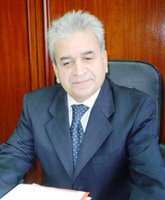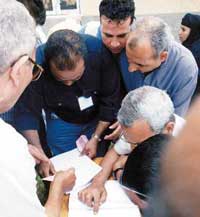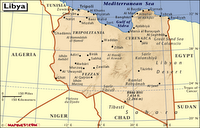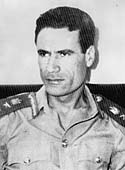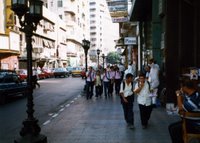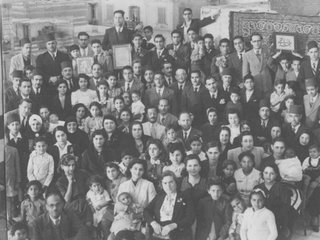 As a continuation of the previous post titled, "Recognition of the Baha'i Faith: Egypt's Past Role", a touching human story was well documented by a descendent of one of the families involved in those historical events of 1925 in a southern Egyptian village. To insure the accuracy of that account, it is posted here, in its entirety. Permission was granted by her son, the author of the narrative, for its inclusion in this post. This story, depicting the life of a devoted mother, perfectly illustrates the critical role women played in cementing together the Egyptian Baha'i community. The fruits of the sacrifices she made, the suffering she endured and the heroic contributions she offered, could be easily seen in her descendents who had been nourished by her example throughout their lives, and have continued to serve humanity in different capacities and at several locations around the world. This story also gives us a taste of the daily lives of Baha'is in Egypt who--without any justification--endure untold suffering, ironically because of beliefs that are consistent with all forms of decency, equality and justice.
As a continuation of the previous post titled, "Recognition of the Baha'i Faith: Egypt's Past Role", a touching human story was well documented by a descendent of one of the families involved in those historical events of 1925 in a southern Egyptian village. To insure the accuracy of that account, it is posted here, in its entirety. Permission was granted by her son, the author of the narrative, for its inclusion in this post. This story, depicting the life of a devoted mother, perfectly illustrates the critical role women played in cementing together the Egyptian Baha'i community. The fruits of the sacrifices she made, the suffering she endured and the heroic contributions she offered, could be easily seen in her descendents who had been nourished by her example throughout their lives, and have continued to serve humanity in different capacities and at several locations around the world. This story also gives us a taste of the daily lives of Baha'is in Egypt who--without any justification--endure untold suffering, ironically because of beliefs that are consistent with all forms of decency, equality and justice.
 Fatimeh Hafiz-Hassan (1924 - 2005)
Fatimeh Hafiz-Hassan (1924 - 2005)
Fatimeh Hafiz was born in 1924 in an obscure village in Upper Egypt that was later immortalized by Shoghi Effendi in his mighty chronology of the first century of the Baha'i Faith. Her father, Sheikh Hafiz, was one of the few villagers who embraced, some eight years earlier, a previously unheard of religion, called the Baha'i Faith. His action met the initial resentment and later fierce opposition of the entire village. Fatimeh's parents were married, by virtue of a traditional Muslim ceremony, one year before her birth.
When she was barely one year old, a great upheaval took place in her nascent family: The High Muslim Court of the Province, by instigation of the fanatic village Chief, ordered the separation of her parents, on the grounds that her father became an apostate who should not be allowed to continue living with a Muslim wife. The ruling, which also provided for the separation of two other couples, unwittingly declared the Baha'i Faith as a religion on its own that is totally independent from Islam, thus initiating the process of its emancipation and recognition in the heartland of Islamic orthodoxy.
 After being forcefully separated from her husband by her relatives, Fatimeh's mother fled back to her husband's home and declared herself a Baha'i like him. This mother was later to play a major role as the head of a devoted Baha'i family, after the untimely passing of her husband in 1941, and in the many years that followed as the only Baha'i who remained in the village until her passing in 1969.
After being forcefully separated from her husband by her relatives, Fatimeh's mother fled back to her husband's home and declared herself a Baha'i like him. This mother was later to play a major role as the head of a devoted Baha'i family, after the untimely passing of her husband in 1941, and in the many years that followed as the only Baha'i who remained in the village until her passing in 1969.
Fatimeh did not obtain any formal education, simply because there were no schools in the village, even for boys. The only education that she had, albeit being an instruction that shaped her life and set her on a glorious path of service, was the morals and ethics that were taught to her, both in word and example, by her parents, and few Baha'i tutorial classes that were conducted by a young village believer who was later to become her husband. Apart from melodiously chanting a good number of Baha'i prayers and some passages from the Holy Writings that she learned to recite by heart, Fatimeh could not read or write.
As it was the village custom of those days, girls would marry at a very young age. By the time she became an attractive girl of fifteen, tens of proposals from rich families were already rejected by her parents. They preferred, instead, to wed her to the only Baha'i youth in the village, Hassan M. Hassan. To give their union a distinct Baha'i identity, Fatimeh and Hassan obtained a Baha'i marriage ceremony in 1939, at the National Baha'i Centre in Cairo.
 When they returned to the village, the newly weds were not a welcome sight to its people. They were even vilified by a mob that was aroused by a rumor that they went to Cairo to conduct a "church marriage"--a taboo in an entirely Muslim village. Undaunted by this new opposition, they forged ahead with their way in life, in spite of a business boycott that badly hurt Hassan's modest trading endeavors.
When they returned to the village, the newly weds were not a welcome sight to its people. They were even vilified by a mob that was aroused by a rumor that they went to Cairo to conduct a "church marriage"--a taboo in an entirely Muslim village. Undaunted by this new opposition, they forged ahead with their way in life, in spite of a business boycott that badly hurt Hassan's modest trading endeavors.
They were more than compensated to receive their first child in 1941. Fatimeh's spontaneous spiritual qualities of contentment, joy and care could make ends meets at times of financial difficulty. Occasionally, the couple would receive helpful gifts of crops and food from their loving parents, but this was soon to come to an end: Fatimeh's father died in a bout of plague that struck the village. His sudden death was catastrophic, as his family became the target of the wrath and vengeance of the same village Chief who led the attacks against the village believers fifteen years earlier. Angered at the divulgence by Sheikh Hafiz of the once concealed news of the plague to the higher health authorities before his death at a provincial hospital, the Chief decided to pitch the tents of the quarantine team, that was rushed by the health authorities in Cairo, right on the farmland of the deceased 'heretic'--an act that destroyed a crop that his widow and children direly needed. However, this courageous and enlightened act of Sheikh Hafiz must have saved hundreds of lives that would have perished had the epidemic was not thus contained. Instead of caring only for themselves, Hassan and Fatimeh had then to care for Fatimeh's widowed mother and her six young children. Hassan and his mother-in-law would labor in the family's land from dawn to sunset, while Fatimeh would be left home to tend to her younger siblings at home
 In spite of poverty and harsh life, Hassan and Fatimeh never compromised their Baha'i identity. Each time a child would be born to them, they would insist on recording the newly born as Baha'i, to the dismay of the notorious village Chief. Being an experienced teacher of Baha'i children classes himself, Hassan was so happy to have children of his own to whom he and his wife would teach moral and spiritual principles that shaped their future. Morning and evening devotions were regular events that brought the couple and their children together for spiritual sustenance. The family regularly hosted Nineteen Day Feasts and encouraged the few other village believers to observe Baha'i Holidays--all in a joyfulfull manner that would win the awe and admiration of neighbors and onlookers.
In spite of poverty and harsh life, Hassan and Fatimeh never compromised their Baha'i identity. Each time a child would be born to them, they would insist on recording the newly born as Baha'i, to the dismay of the notorious village Chief. Being an experienced teacher of Baha'i children classes himself, Hassan was so happy to have children of his own to whom he and his wife would teach moral and spiritual principles that shaped their future. Morning and evening devotions were regular events that brought the couple and their children together for spiritual sustenance. The family regularly hosted Nineteen Day Feasts and encouraged the few other village believers to observe Baha'i Holidays--all in a joyfulfull manner that would win the awe and admiration of neighbors and onlookers.
 The couple decided to move in 1951 with their five children to a provincial town for better prospects of work and education. For eight years afterwards, the couple moved with their children from town to town for economic reasons, before ending up in Cairo by 1958--then with a total of nine children to care for. Hassan and Fatimeh were worn-down by a continuous need to cope with ever-changing living conditions, but the period of their financial difficulty was soon to come to an end. A few years thereafter, their elder children attained a certain degree of education that gave them suitable employment. They became able to share some of their parents' financial burdens. However, the future had in store for them a difficulty of a different nature: The Baha'i Faith was officially banned in Egypt in 1960.
The couple decided to move in 1951 with their five children to a provincial town for better prospects of work and education. For eight years afterwards, the couple moved with their children from town to town for economic reasons, before ending up in Cairo by 1958--then with a total of nine children to care for. Hassan and Fatimeh were worn-down by a continuous need to cope with ever-changing living conditions, but the period of their financial difficulty was soon to come to an end. A few years thereafter, their elder children attained a certain degree of education that gave them suitable employment. They became able to share some of their parents' financial burdens. However, the future had in store for them a difficulty of a different nature: The Baha'i Faith was officially banned in Egypt in 1960.
Successive waves of official and public persecution were drummed-up, starting with the disbandment of Baha'i spiritual assemblies and confiscation of their premises and all other property. Then the Baha'i community itself was denied its basic civil rights and became the subject of other harassments. Five years on, the authorities started to arrest and prosecute some of the known believers under false allegations. Those carefully orchestrated lawsuits that were intended to 'wipe out' the Baha'i Faith from Egypt, were often accompanied by a nationwide defamatory campaign in the official media. However, and with the exception of once isolated case where a court martial was fraudulently set up for an innocent Baha'i policeman, none of those court cases produced a final indictment of any of the hundred odd Baha'is that were prosecuted. In each of such cases, notably those of 1965, 1967, 1970, 1972, 1984, and 2001, the Baha'is who would be spared arrest and imprisonment were to face the more formidable task of caring for the Baha'i prisoners, against official and public harassment and with insufficient financial resources.
 This was the task that Fatimeh shared so sacrificially and audaciously during the 1965-1972 waves of persecutions. Citing the 1972 case as an example, where the defendants were remanded in the prison of Tanta, 80 km to the north of Cairo, Fatimeh had to care for her husband who was imprisoned, together with six of their children and a number of other close relatives. For a month and a half, she would start her day with a journey on the first train that leaves Cairo at dawn to Tanta, carrying the food that she cooked the night before. After delivering the food to the hostile and greedy prison-guards, she would remain roaming around the prison for any news, before she would return to Cairo by the sunset train. As soon as she reached home by late evening she would spend most of the night cooking, then slept for a couple of hours before jumping from bed in time to catch the next dawn train. Totally forgetful of her physical comfort and oblivious of the chronic ills that became her lot due to past difficulties, Fatimeh would beam with joy at the sight of any of the prisoners, giving them such words of encouragement that one could only read in historical texts such as Nabil's "Dawn-Breakers" or the Abd'ul-Baha's "Memorial of the Faithful". In addition to these burdensome duties, she would also assist and encourage other similarly afflicted Baha'i households, and make the necessary contacts with the lawyers to defend the innocent prisoners.
This was the task that Fatimeh shared so sacrificially and audaciously during the 1965-1972 waves of persecutions. Citing the 1972 case as an example, where the defendants were remanded in the prison of Tanta, 80 km to the north of Cairo, Fatimeh had to care for her husband who was imprisoned, together with six of their children and a number of other close relatives. For a month and a half, she would start her day with a journey on the first train that leaves Cairo at dawn to Tanta, carrying the food that she cooked the night before. After delivering the food to the hostile and greedy prison-guards, she would remain roaming around the prison for any news, before she would return to Cairo by the sunset train. As soon as she reached home by late evening she would spend most of the night cooking, then slept for a couple of hours before jumping from bed in time to catch the next dawn train. Totally forgetful of her physical comfort and oblivious of the chronic ills that became her lot due to past difficulties, Fatimeh would beam with joy at the sight of any of the prisoners, giving them such words of encouragement that one could only read in historical texts such as Nabil's "Dawn-Breakers" or the Abd'ul-Baha's "Memorial of the Faithful". In addition to these burdensome duties, she would also assist and encourage other similarly afflicted Baha'i households, and make the necessary contacts with the lawyers to defend the innocent prisoners.
Fatimeh's fortitude and courage at that time won the admiration of friends and foes alike. At the victorious close of one of those imprisonment episodes, a prison guard hesitatingly approached one of the defendants whom he was about to release, incidentally one of Fatimeh's children, and asked in a low voice, "Do you know that lady who used to come here every day?" "Yes! She is my mother." The prisoner replied. "Is it so?" the guard exclaimed, "That lady can do what ten men combined would fail to do!"
By May 1974, another chapter of Fatimeh's ordeals opened: Her husband Hassan suffered a stroke that left him half-paralyzed for the rest of his life. For nineteen years she nursed her husband and cared for his needs, in her usual spirit of exemplary love and dedication, until his peaceful passing in 1993. The twelve years that followed afterwards saw Fatimeh change gradually into an aged and frail figure, yet without losing her joyful and radiant spirit. Succumbing to cruel arthritis, diabetes and Alzheimer's, Fatimeh finally bore the mark of years that brought her the tests and tribulations that she had so heroically vanquished. Bedridden for four months and after a two-day coma, she opened her eyes and beckoned her grief-stricken children and grandchildren who were by her bedside. In her categorical simplicity and humility, she summed up her final will in two sentences that she could murmur:
"Forgive me for any trespasses that I might have committed!"
"Love one another the way I always loved you!"
Then she closed her eyes for ever, as her noble soul winged its way to Eternity. The time was shortly after 1.00 pm, on the 25th of March 2005, at her home in Cairo.
Fatimeh is survived by a large family of children, grandchildren, and great-grandchildren who owe their faith to their loving father and mother, and reside in Egypt, Canada, and Uganda. She will also be remembered by a Baha'i community that will continue to cherish her exemplary selflessness, sacrifice and, above all, her unwavering belief in the Faith that she had so stalwartly upheld and defended. In one of the many letters of condolences received, the following paragraph tells, in a nutshell, what Fatimeh's life was:
"We cannot forget her persistent instances of great courage at times of imprisonment, detention, and persecutions. We would invariably find her standing there, rushing for service, neither daunted by any opposition nor hampered by any barrier. Blessed is she! She is certainly now amidst her loving friends: her finding happiness among them, and them finding happiness with her--a perpetual happiness that will last as long as God's Nether and Higher Kingdoms endure."
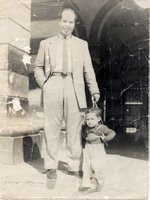 The litigation was highly publicized and continued until a judgement was reached in June 1952. Several issues were raised during the trial. In particular, after obtaining a "Fatwa" from Sheikh al-Azhar, the government counter-attacked by accusing the plaintiff of apostasy. It even went as far as demanding Mustapha's execution and the imprisonment of his wife for allegedly marrying an apostate. The government defense also asserted that his marriage must be nullified and that his son was illegitimate.
The litigation was highly publicized and continued until a judgement was reached in June 1952. Several issues were raised during the trial. In particular, after obtaining a "Fatwa" from Sheikh al-Azhar, the government counter-attacked by accusing the plaintiff of apostasy. It even went as far as demanding Mustapha's execution and the imprisonment of his wife for allegedly marrying an apostate. The government defense also asserted that his marriage must be nullified and that his son was illegitimate. A close-up of the United Nations Charter with the Egyptian delegation in the background at the signing ceremony in San Francisco. (Credit: UN Photo # 24479)
A close-up of the United Nations Charter with the Egyptian delegation in the background at the signing ceremony in San Francisco. (Credit: UN Photo # 24479)



















